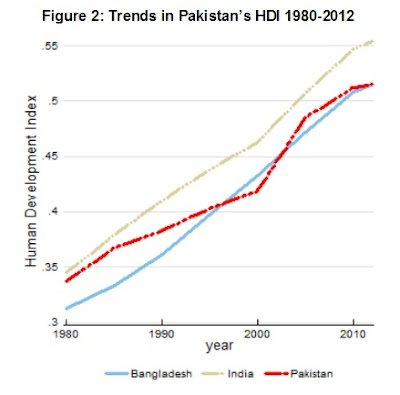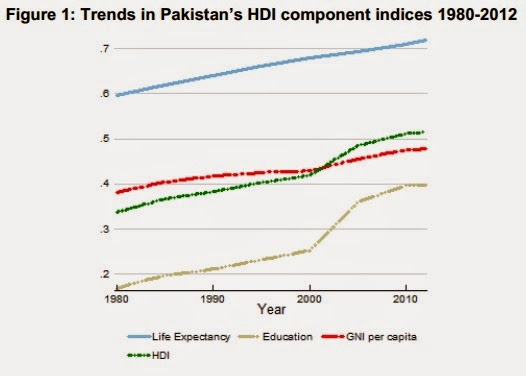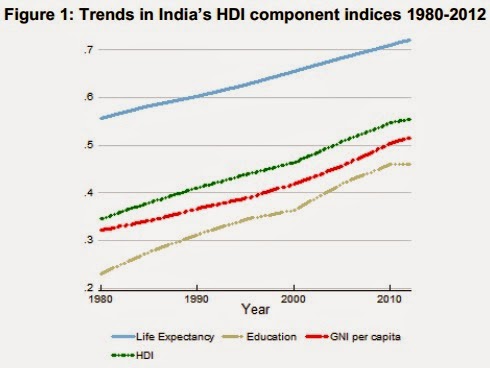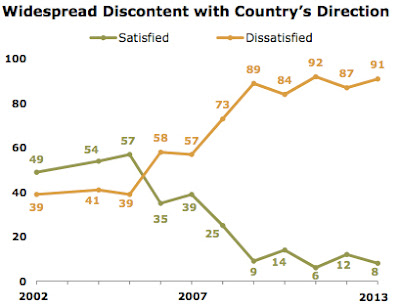PakAlumni Worldwide: The Global Social Network
The Global Social Network
PPP and PMLN Kleptocrats Bring Neither Democracy Nor Development in Pakistan
“Na Khuda hi mila, na visaal-e-sanam/Na udhar kay rahay, na idhar kay rahe (I found neither faith, nor union with my lover/And now I belong neither there nor here).”
Pakistan's quest for democracy under civilian rule has produced neither democracy nor development in the Islamic country of over 180 million people. Currently, Pakistan is experiencing 6th consecutive year of stagnant economy and human development under an elected but highly corrupt "democratic" government run by the Sharif family and their cronies for their own benefit.
Is it a Democracy?
Can one call it a rule-of-law or democracy when the Sharifs illegally order the Lahore police to attack the home of Allama Tahir ul Qadri, kill over a dozen unarmed civilians including women, and then refuse to file a report (FIR) of the incident at the local police station? Can you call it constitutional rule when the ruling politicians openly defy the Supreme Court orders to hold local government elections under Article 140 (A) of the Pakistan constitution? Is it democracy when all of the most powerful government positions are held a few members of the Sharif family and their close friends?
Is it Development?
Is it development when Pakistan's human development progress is the slowest in decades? Is it development when Pakistan faces another lost decade like the decade of 1990s under PPP and PMLN rule? Is it development when Pakistan continues to drop in world rankings on social indicators included in the UNDP's HDI index?
Pakistan's HDI grew an average rate of 2.7% per year under President Musharraf from 2000 to 2007, and then its pace slowed to 0.7% per year in 2008 to 2012 under elected politicians, according to the 2013 Human Development Report titled “The Rise of the South: Human Progress in a Diverse World”.
 |
| Source: Human Development Report 2013-Pakistan |
History of Human Development in Pakistan:
At 0.515, Pakistan's HDI is lower than the average HDI value of 0.558 for South Asia which is the second lowest among the various regions of the world tracked by UNDP. Between 2000 and 2012, the region registered annual growth of 1.43% in HDI value, which is the highest of the regions. Afghanistan achieved the fastest growth (3.9%), followed by Pakistan (1.7%) and India (1.5%), according to the United Nations Development Program.
Overall, Pakistan's human development score rose by 18.9% during Musharraf years and increased just 3.4% under elected leadership since 2008. The news on the human development front got even worse in the last three years, with HDI growth slowing down as low as 0.59% — a paltry average annual increase of under 0.20 per cent.
Who's to blame for this dramatic slowdown in the nation's human development? Who gave it a low priority? Zardari? Peoples' Party? Sharif brothers? PML (N)? PML (Q)? Awami National Party? Muttahida Qaumi Movement? The answer is: All of them. They were all part of the government. In fact, the biggest share of the blame must be assigned to PML (N).
Sharif brothers weren't part of the ruling coalition at the center. So why should the PML (N) share the blame for falling growth in the nation's HDI? They must accept a large part of the blame because education and health, the biggest contributors to human development, are both provincial subjects and PML(N) was responsible for education and health care of more than half of Pakistan's population.
 |
| Source: The Rise of the South: Human Progress in a Diverse World |
 |
| Source: The Rise of the South: Human Progress in a Diverse World |
Going further back to the decade of 1990s when the civilian leadership of the country alternated between PML (N) and PPP, the increase in Pakistan's HDI was 9.3% from 1990 to 2000, less than half of the HDI gain of 18.9% on Musharraf's watch from 2000 to 2007.

Acceleration of HDI growth during Musharraf years was not an accident. Not only did Musharraf's policies accelerate economic growth, helped create 13 million new jobs, cut poverty in half and halved the country's total debt burden in the period from 2000 to 2007, his government also ensured significant investment and focus on education and health care. The annual budget for higher education increased from only Rs 500 million in 2000 to Rs 28 billion in 2008, to lay the foundations of the development of a strong knowledge economy, according to former education minister Dr. Ata ur Rehman. Student enrollment in universities increased from 270,000 to 900,000 and the number of universities and degree awarding institutions increased from 57 in 2000 to 137 by 2008. In 2011, a Pakistani government commission on education found that public funding for education has been cut from 2.5% of GDP in 2007 to just 1.5% - less than the annual subsidy given to the various PSUs including Pakistan Steel and PIA, both of which continue to sustain huge losses due to patronage-based hiring.
 |
| Source: Pew Surveys in Pakistan |
Looking at examples of nations such as the Asian Tigers which have achieved great success in the last few decades, the basic ingredient in each case has been large social sector investments they have made. It will be extremely difficult for Pakistan to catch up unless similar investments are made by Pakistani leaders.
Summary:
Civilian rule in Pakistan has delivered neither democracy nor development. The country stands at a crucial juncture with highly energized Pakistanis staging a historic massive sit-in in Islamabad since August 14, 2014. They have shaken up the ruling Sharif family and forced them to seek Pakistani military's help to save themselves from the wrath of the people. Any decisions made by Pakistan's military and politicians now will have long term impact on the health of the country. Let's hope these decisions bring about changes which help accelerate socio-economic development while making Pakistan's rulers more accountable and responsive to the people for their actions.
Here's a video discussion on the current political crisis in Pakistan:
http://vimeo.com/104722439
http://youtu.be/r66ep0WghZU
Pakistan PM Invites Army Intervention; Can Army Chief Save Nawaz Sh... from WBT TV on Vimeo.
Related Links:
Haq's Musings
Another Lost Decade in Pakistan?
Pakistan Military's Role in Current Crisis
Civilian "Democracy" Vs Military "Dictatorship" Debate in Pakistan
Saving Pakistan's Education
Political Patronage Trumps Public Policy in Pakistan
Dr. Ata-ur-Rehman Defends Pakistan's Higher Education Reforms
Twelve Years Since Musharraf's Coup
Musharraf's Legacy
Pakistan's Economic Performance 2008-2010
Role of Politics in Pakistan Economy
India and Pakistan Compared in 2011
Musharraf's Coup Revived Pakistan's Economy
What If Musharraf Had Said No?
Twitter Feed
Live Traffic Feed
Sponsored Links
South Asia Investor Review
Investor Information Blog
Haq's Musings
Riaz Haq's Current Affairs Blog
Please Bookmark This Page!
Blog Posts
India-Israel Axis Threatens Peace in South Asia
The bonhomie between Israeli Prime Minister Netanyahu, an indicted war criminal, and Indian Prime Minister Narendra Modi, accused of killing thousands of Muslims, was on full display this week in Israel. Both leaders committed to supporting the Afghan Taliban regime which is accused of facilitating cross-border terrorist attacks by the TTP in Pakistan. Mr. Modi was warmly welcomed by…
ContinuePosted by Riaz Haq on February 27, 2026 at 10:45am
Modi's AI Spectacle: Chaos and Deception in New Delhi
The India AI Impact Summit 2026, held at Bharat Mandapam in New Delhi, has been marred by chaos, confusion and deception. The events on the ground have produced unintended media headlines for India's Prime Minister Narendra Modi who wants to be seen as the "vishwaguru" (teacher of the world) in the field of artificial intelligence as well. First, there was massive chaos on the opening day, with long…
ContinuePosted by Riaz Haq on February 19, 2026 at 12:00pm — 13 Comments
© 2026 Created by Riaz Haq.
Powered by
![]()


You need to be a member of PakAlumni Worldwide: The Global Social Network to add comments!
Join PakAlumni Worldwide: The Global Social Network